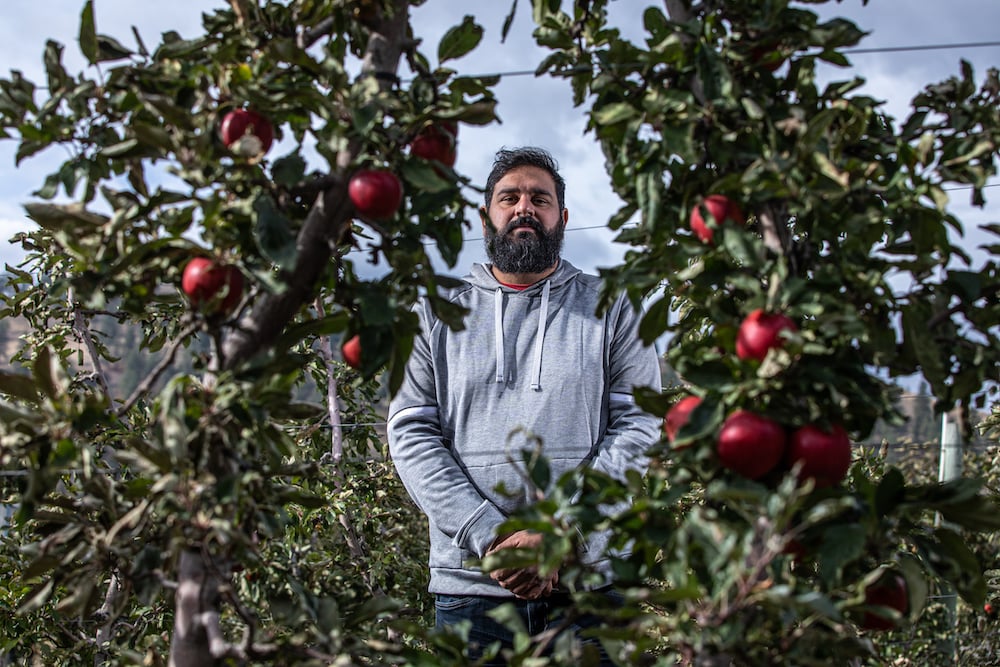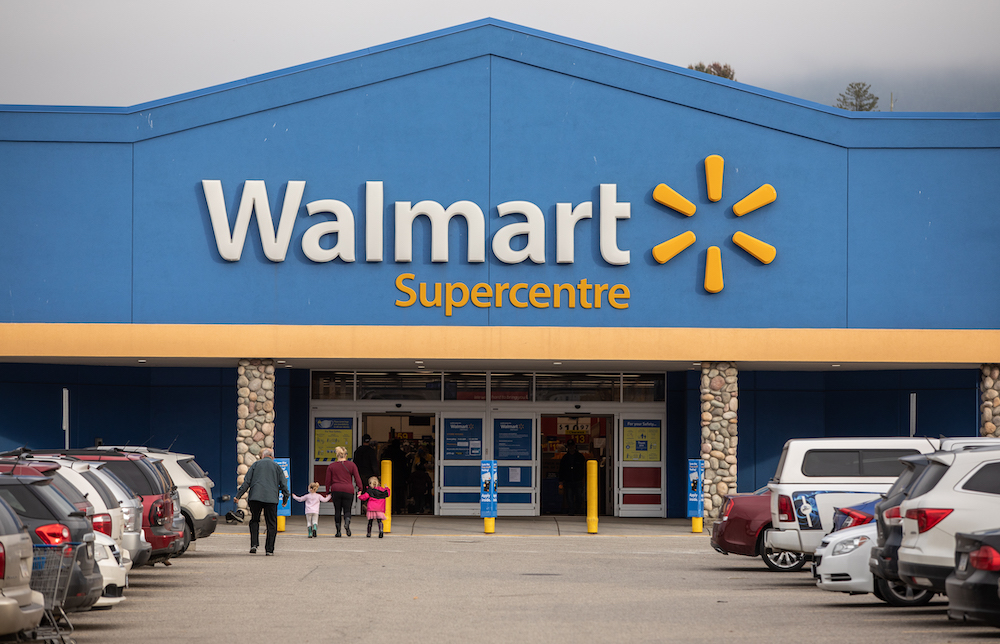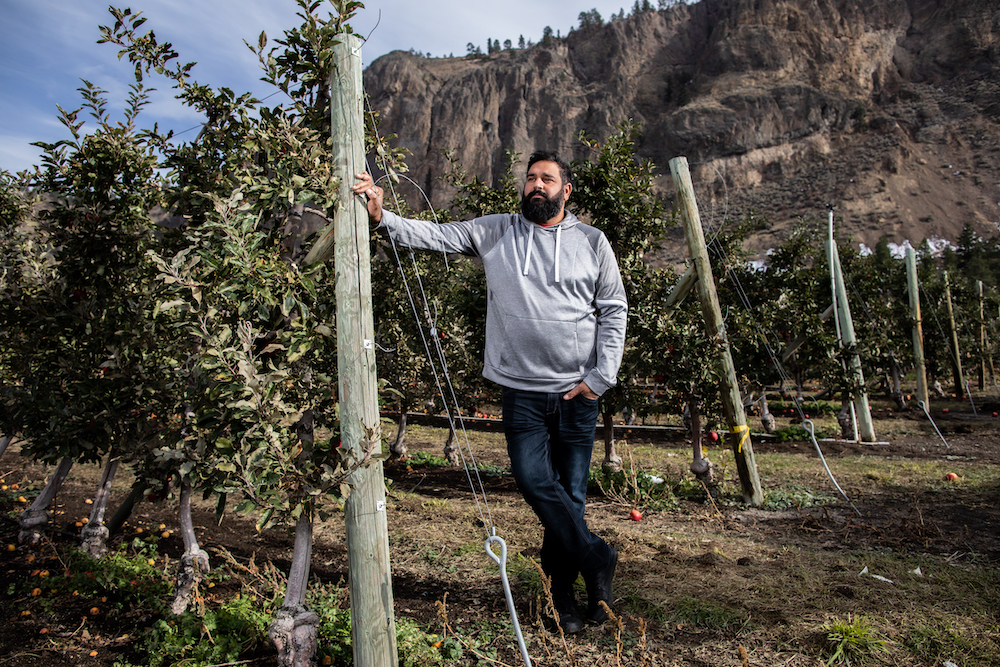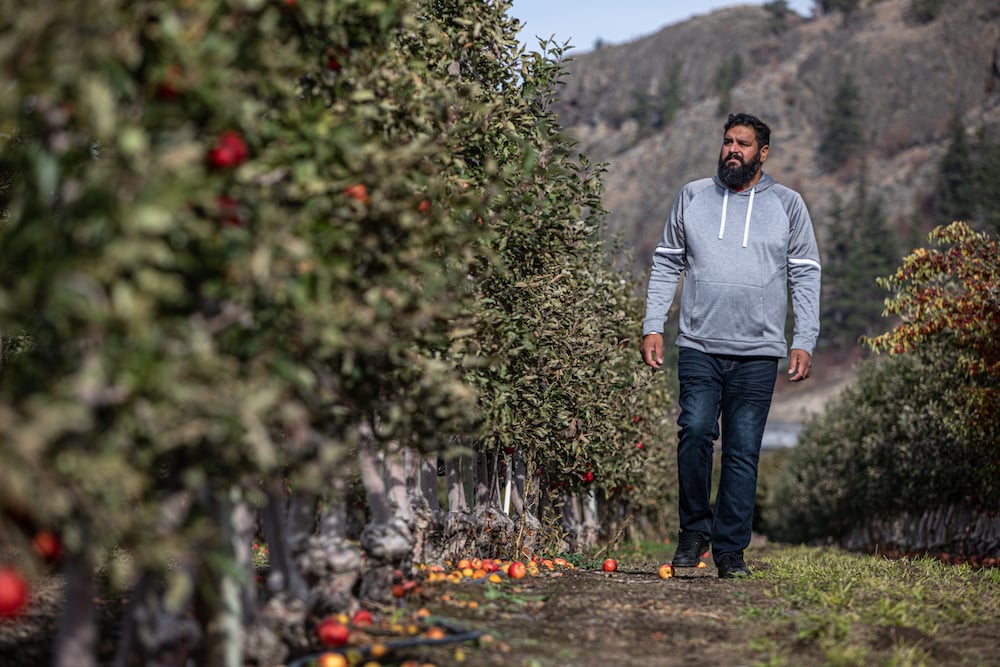Between COVID-19, labour shortages and bad weather, Sukhdeep Brar has had a rough year growing apples. But as giant grocery chains drive wholesale prices down to pennies a pound, he says the struggle to keep apple production in B.C. started long before this COVID-19 pandemic.
A second-generation farmer, Brar grows ground crops like tomatoes and peppers and tree fruits like cherries and apples on his 115-acre farm in Summerland. He has 12 acres reserved for apples, with an equal mix of old, massive trees and neat rows of the newer high-density plantings. In a normal year, he would spend all winter pruning trees and preparing orchards before recouping the money with the fall harvest.
But this isn’t a normal year.
Because of COVID-19, only around 5,000 out of the usual 8,000 foreign migrant workers and backpackers arrived in B.C. to help pick fruits. Brar says the provincial government responded well by taking responsibility for quarantining newly arrived workers.
But the labour shortage was costly, he said. After fruitless attempts at recruiting locals, he had only five pickers instead of the usual 16 to help with the harvest.
It’s hard physical work, Brar acknowledged.
Depending on the tree’s size, the pickers would have to climb up and down a six- or 10-foot ladder to pluck the fruits, repeating the motion over and over again with each individual tree. This year, with the fruits ripening at different paces, it took three sweeps of the orchard to ensure all the apples were picked at their best.
“I could spend 24 hours a day out there and still not catch up at this point, with the way the year has gone,” he said in an Oct. 20 interview with The Tyee during a break between long stretches of apple picking.
“I’m spending a lot more [time] than my wife would like me to — I guess all day. I also have two young children, so it makes it even more crazy for me.”
Three days after we spoke, the region was hit with heavy snowfall, with Kelowna breaking a 120-year-old record. In Summerland, around 50 kilometres south, Brar rushed to rescue his apples before they froze on the trees.
“People in our area saw the forecast, so we just hustled. We were lucky enough that we actually finished the Friday that it snowed,” he recalled with relief. By November, his 320,000 pounds of apples had been picked and delivered to a local co-op that handles their sorting, packing and shipping to customers like grocery stores.
“We tried to find anybody we could to come out and help us. Once we finished, we went and helped our neighbour pick.”
But this hell of a fall apple season is just the tip of the iceberg of troubles that threatens to sink B.C. apple growers. Their businesses have been on a steep decline for years.
‘The farewell tour’
Apples are still B.C.’s biggest tree fruit crop by production volume.
But on the ground, the industry is contracting. And for Brar and the BC Fruit Growers’ Association, an organization representing close to half of the province’s 800 tree fruit growers, the main reason is clear.
Despite a growing interest in small and local vendors, five retailers — Loblaws, Sobeys, Metro, Walmart and Costco — control around 80 per cent of Canada’s grocery retail market.
Sylvain Charlebois, a Dalhousie University professor who researches food distribution and policy, pointed to consumers’ demand for more choice and lower prices as one of the factors driving grocers to consolidate and seek the scale to be more competitive. Canada’s large geography and sparse population also lead to retail concentration, he said.
But for apple growers, this means little power to negotiate prices, even as they have fallen to less than half their production costs.
“They say this is the price, then this is the price,” said Brar.
Being an apple grower wasn’t always this tough.
The crabapple is the only apple native to Canada. The first household varieties arrived in the 1600s, when French settlers colonized what became Nova Scotia.
In 1859, Father Pandosy — a French priest — grew the first trees in the Okanagan-Similkameen valleys, where B.C.’s apple industry is now concentrated.
Apple trees thrive in the region.
“The Canadian Okanagan is one of the best places in the world to grow deciduous tree fruit, in particular apples and sweet cherries,” said Kent Mullinix, an agriculture professor at Kwantlen Polytechnic University.
New farmers like Brar’s father Harbhajan, who immigrated to Canada from India in the 1970s, thought so too. Alongside his brother and a few relatives, Harbhajan initially came to Penticton for a sawmill job, but also worked on orchards to make ends meet.
The family eventually started leasing land before buying their first Summerland orchard in the 1980s, where Harbhajan still lives.
Brar remembers an “awesome” childhood on that 10-acre orchard, surrounded by a big extended family but with enough space to ride dirt bikes with his friends. It was also there he learned to farm, working alongside his father and uncle.
He tried to escape small town life by enrolling in Simon Fraser University, eventually getting a degree in human biology. But he also quickly realized that the city was not for him.
“I’m more of a farm boy from out here,” Brar said with a laugh. “I knew right away that I wanted to come back, so I took over the business. It’s been six, seven years now.”

Brar dotes on his orchard like one of his children. But he now often wonders if it’s even worth it to pick his apples. It costs him 30 to 35 cents per pound to produce them. Yet buyers will typically only pay 12 to 15 cents per pound.
Apples sell for around $2 per pound in grocery stores, but growers receive a tiny portion of that amount — though there are other costs before the fruits land on store shelves.
A director of the BC Fruit Growers' Association, Brar says he’s not alone in facing prices below his cost of production.
“What’s the point of even harvesting the apples if I’m going to be losing money picking? That’s the big issue we’re facing right now, and there are a lot of apple growers who have way, way more fruits than I do, and I feel their pain. We get their calls and it’s terrible,” he said in October.
“They’re at this point where they’re like, ‘What do we do? Do we just abandon the whole field?’”
The association held a 12-cent-a-pound apple sale at a Kelowna farmers market in October to raise awareness about low prices and the financial struggles its members were facing.
Peter Simonsen, a fruit farmer in Naramata and the BCFGA’s vice-president, called it “the farewell tour” for B.C. apples in an interview with The Tyee.
“The plan is to make a bit more noise, to make a bunch of horrible dying sounds,” he said. “I think our industry deserves to not go quietly into the good night.”
‘A real killer’ south of the border
B.C. growers face another challenge from the other side of the Canada-U.S. border.
Washington state accounts for 65 per cent of apple production in the U.S. and almost all of the country’s apple exports.
That includes 200 million pounds of apples exported annually to Canada — its second biggest market after Mexico. That’s around 1.3 times the apple production in B.C.
This year, Washington state apple growers can also receive almost seven cents Canadian a pound in U.S. COVID-19 aid. B.C. growers do not receive an equivalent subsidy.
“That’s a real killer for us too, because it just means that they can produce now for seven cents less and still survive,” Simonsen said.
The apple growers’ plight also comes back to us.
A growing interest in local food doesn’t necessarily benefit producers. According to a study by Charlebois, 80 per cent of Canadians say they are willing to pay more for local food. But only 25 per cent are “actively looking” for it.
“Grocers know that when consumers walk into the grocery store, they are going to be looking at one thing and that’s the price,” Charlebois said.

In an interview with The Tyee, B.C. Agriculture Minister Lana Popham acknowledged consumers’ focus on price. Besides pointing to the province’s agricultural support programs, she encouraged people to choose local food, especially as the province partners with grocery stores to highlight products via the Buy BC program.
“If we don’t support the apple industry by pursuing and finding B.C. apples to purchase, there won’t be any B.C. apples, so it’s our choice as consumers to help with the positive story,” she said.
‘A way to even the playing field’
The big grocers can dictate more than just prices. In July, Walmart unilaterally announced new fees for suppliers — a change quickly followed by Loblaws and the national group representing Metro.
The move brought swift criticisms. “This is market abuse, there’s no other way to put it,” Charlebois said.
Groups representing producers, processors and small grocers called on Ottawa to establish a grocers’ code of conduct to protect suppliers.
The idea is not new. The U.K. adopted one in 2009. Australia has had a voluntary code since 2015, and all but one of its main grocers have signed on. So far, these two countries have reportedly seen fairer market practices without increased prices for consumers.
Rebecca Lee, executive director of the Canadian Horticultural Council, said suppliers need protection.
“We’d like to have parameters created to provide a better balance in the food supply chain and also help instil a certain level of certainty that the producers will be paid on time with the negotiated price, no surprises, no retroactive fees,” she said.
Simonsen of the fruit growers' association agrees. “It’s just a way to even the playing field.”
In a statement to The Tyee, Michelle Wasylyshen — spokesperson for the Retail Council of Canada, which represents retailers across Canada, including the big grocers — said grocery is a thin-margin business and warned that governments should be leery about “putting their thumb on the scale” in favour of supplier giants like Coca-Cola and Nestle.
Not all big retailers oppose the idea, however. In late October, Sobeys, which operates IGA, Safeway, Thrifty Foods and other stores, pushed back against the fees and voiced an openness to adopting a code.
And after initially saying provinces should deal with the issue, the federal government announced in late November that it is now studying the impact of retailer fees with other jurisdictions and is planning to release a report by July. Popham said a November meeting with federal and provincial agricultural ministers resulted in a commitment to examine the idea of a grocers’ code of conduct.
“I think the problem right now is that none of us really understand the effect that a code will have completely, so we decided that the best thing to do was to create a working group,” she said, adding that she doesn’t want the potential code to create unintentional barriers for small- and medium-scale farmers and food processors.
Looking for solutions
In the meantime, BCFGA vice-president Simonsen said growers are cutting down orchards and planting cherries and grapes. He predicts that apples will eventually be a niche product in the region.
This prospect concerns Kwantlen’s Mullinix. He pointed to the food supply disruptions caused by the COVID-19 pandemic as a caution against giving up B.C.’s domestic apple production capacity, especially as there are already warnings that climate change would threaten long-term food security.
“COVID-19 is just a dress rehearsal for disruptions we might see and can certainly anticipate resulting from climate change,” he said. “It really just makes no sense to me to stake provincial or national food security on a highly vulnerable transnational food system.”
Mullinix wants to see bolder solutions. Governments need to re-examine their policies and steer away from “relegating the food system to a hyper-capitalistic mentality, where the cheapest producers on the global scale dominate,” he said.
Charlebois acknowledged the importance of keeping some domestic production, but warned against protectionist policies, like tariffs, that would add costs for consumers. Instead, he suggested breeding new varieties and working with processors and retailers to find opportunities to use apples in new ways.

Back in Summerland, Brar said work continues, with trees needing to be pruned before it gets too cold. He’s already looking ahead to next year’s harvest — determined to continue an operation started by his father — but acknowledged the toll of staying in this business.
“I can’t speak on behalf of everyone else, but in my personal operation, stress levels are extremely high,” Brar said. “There are just some things that need to be worked out that are above my pay grade.
“I’m just a farmer here. I’m trying to do the best I can, just as all of my colleagues around the valley.” ![]()
Read more: Local Economy, Food
















Tyee Commenting Guidelines
Comments that violate guidelines risk being deleted, and violations may result in a temporary or permanent user ban. Maintain the spirit of good conversation to stay in the discussion.
*Please note The Tyee is not a forum for spreading misinformation about COVID-19, denying its existence or minimizing its risk to public health.
Do:
Do not: